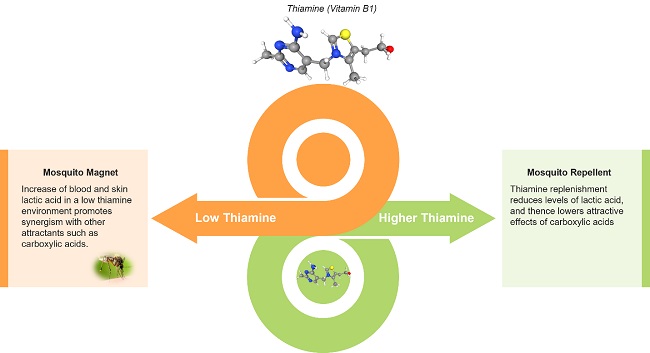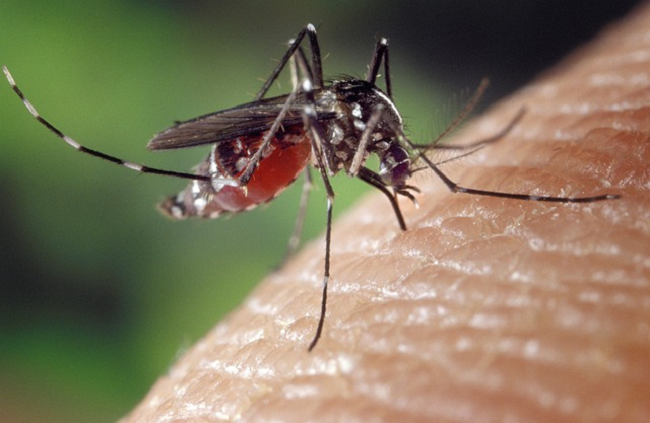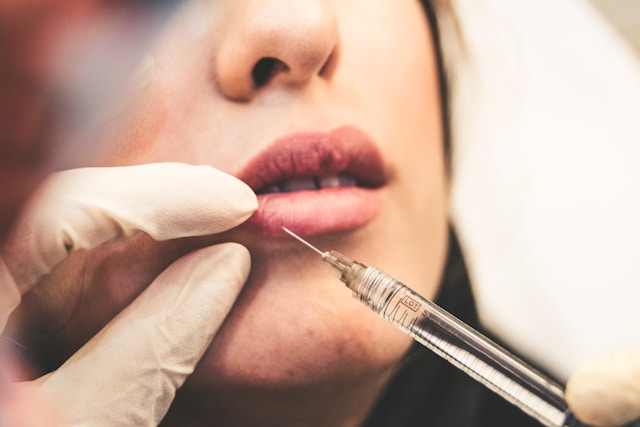A new study shows that you can be “highly attractive” if you have enough carboxylic acid on your skin. Highly attractive to mosquitos, that is.
Mosquitoes are an ideal vector for pathogen contraction and transmission between hosts. These pathogens include viruses such as Dengue, Yellow Fever, Zika, West Nile Virus, and Chikungunya. Parasites that cause malaria in tropical and subtropical countries are also transmitted by mosquito bites. It is therefore logical that increased exposure, or attractiveness, to mosquitos will increase the probability of contracting such pathogens. Why then do some individuals seem to be targeted by mosquitoes more than others?
A new study attempted to shed light on this age-old question of why some people are greater mosquito magnets than others. Indeed, some are victims of relentless mosquito bites and could in fact function as a “mosquito adsorbent” – a courtesy for those around them on a humid day at the park. It turns out that mosquitoes utilize their sense of smell to find food, as expected, but that those with higher levels of certain metabolites get bit more frequently than others. What is interesting is that some genes in mosquitoes allow this sensing to occur. To determine how all of this worked, researchers induced olfactory deficits by knocking out genes in mosquitoes. This caused less odor sensing to occur, but surprisingly mosquitoes were still able to distinguish between highly and weakly attractive individuals. This all indicates that attractiveness to mosquitoes is likely an amalgamation of mechanisms involving genetics and metabolomics.
The specific metabolites analyzed in this study are pentadecanoic, heptadecanoic, and nonadecanoic acids – all grouped as carboxylic acids. These are considered odd number fatty acids (ONFA), a minor group of the fatty acid repertoire in humans. Pentadecanoic and heptadecanoic acids are the most abundant ONFA, composed of 15 and 17 carbon chains, respectively. In contrast to other fatty acids, ONFA are thought to predominantly accumulate in the body from foods (e.g., dairy, meats). However, they can be synthesized in the body from straight chain fatty acids, through the mechanisms of alpha-oxidation.
The Thiamine Connection
It has long been rumored that thiamine could prevent, or at least reduce, mosquito bites. Is there research supporting this claim?
The literature is not clear, but does seem to indicate an indirect connection between thiamine (Vitamin B1) deficiency, or inadequacy, and attractiveness to mosquitos. For example, a research group studying yellow fever mosquitoes, showed that mixed with lactic acid, the carboxylic acid strongly synergizes to elicit mosquito attraction. The authors state:
Addition of lactic acid markedly increased the degree of attractiveness of formerly less attractive human odour samples and they were preferred over those which were originally the most attractive.
Indeed, lactic acid alone, acts as a sufficient mosquito attractant, but is relatively weak compared to the synergism with carboxylic acids. Another older study utilized a bioassay to identify attractants from human skin extracts. Here the mosquitoes were allowed to fly upwind toward odor sources (human skin wash extracts). They found that lactic acid was a major constituent of skin extract and that it was a necessary component for mosquito attraction.
What can cause lactic acid to build up (either in blood or tissues)? One mechanism would be the shunting of pyruvate into the lactate pathway. This can be measured in blood when someone has low thiamine. Indeed, in some conditions, the skin has been shown to carry higher amounts of lactic acid compared to blood levels, due to increased anaerobic glycolysis. Here we would expect lactic and carboxylic acids to suffuse below or above the surface of skin where it can be detected by mosquitos. In addition, a surfeit of lactic acid build up, in an overt thiamine deficiency, may not be required. This is because the mosquitos’ high sense of smell can pick small amount of odors, even when major olfactory-related genes are knocked out.
Contrary Research
On the other hand, a potential argument against the effectiveness of thiamine in repelling mosquitoes comes from a 2005 study. The authors gave individuals over the counter B vitamins in two experiments:
- Experiment 1: B-complex containing 50 mg of B1(thiamine)/B2/B3/B5/B6, 400 µg Folate, 50 µg B12, 50 µg Biotin, and 500 mg Vitamin C. Vitamin C by itself was used as a control since the B-complex contained Vitamin C. Subjects (14 males, and 9 females) were utilized in a cross over experiments, meaning that they would start either placebo or the treatment for 7 days and then switch over to treatment or placebo, respectively. In this scheme each individual would act as his/her own paired experiment, statistically.
- Experiment 2: Used 100 mg B1, with Vitamin C as a control. Subjects (10 males, and 7 females) were studied in the same manner to experiment 1, with 100 mg B1.
The authors did not find statistically significant differences between the groups, and concluded that B vitamins were not helpful in repelling mosquitos.
Possible Problems With the Research
There may be some caveats to the protocol used in this research, that likely masked the true effects of thiamine supplementation. First, the authors may have been limited, but should have used a non-Vitamin C formulation. Although somewhat inconsistent in the scientific literature, Vitamin C supplementation can reduce blood lactate levels in certain settings, “increase in free radical production and lactate levels….were offset by vitamin C supplementation”. This, in theory, would reduce lactate in skin and therefore the strong synergistic effects of lactic with carboxylic acids would be minimized. Second, and more importantly, the method only evaluated volatile components that can be transferred from the skin into the glass bottle used to attract mosquitoes. Lactic acid is a low volatility organic compound. The other positive studies discussed above had instead extracted skin organic compounds, including lactic acid, utilizing ethanol. Overall, the 2005 study was well designed for the questions asked and provided basic preliminary experiments. Unfortunately, the design of the study negated the effects of one key compound, lactic acid, due to volatility-based evaluation. Hence, a follow up study should be performed with these concepts in mind:
- Premeasurement on skin extracts using organic acid extraction methods (ethanol or other compounds).
- Treatment with higher dose thiamine. An example would be 0.5 – 1 gram of thiamine-HCl, for 1 to 4 weeks.
- Mosquito attraction should be performed concomitantly with measurements of thiamine status (ETKA test). Similarly, measurements of lactic acid in skin extracts of treated and non-treated individuals should be performed in order to correlate quantity with phenotype.
The expectation is that individuals who are thiamine deficient would have increased lactic acid in their skin extracts and therefore would serve as a mosquito magnet.

Does Thiamine Status Play a Role in Mosquito Attraction?
The above studies combined elucidate some of the mechanisms in play in individuals who are highly attractive to mosquitos. These include interplay between genetics of mosquitos and organic compounds present in human skin. Individual differences in mosquito attraction may also be attributed in part to temperature, moisture, visual cues, and body odor. Out of these possibilities, body odor plays a major role in mediating these interactions. Specifically, both lactic and carboxylic acids play a synergistic role in attracting mosquitos, and therefore increase the odds of contracting disease. Mechanisms that result in increased lactic acid production such as exercise, and potentially low thiamine metabolism, are likely a risk factor for mosquito bites. Overall, the role for lactic acid in mosquito attraction seems to stir the arrows of mosquito-magnet theory, in-part, towards a mild/subclinical thiamine deficiency, or at least an abnormal metabolic activity. As suggested above, more studies should be performed in order to directly evaluate the effects of thiamine on lactic acid content of human skin in conjunction with effects on attracting mosquitos. In the meant time though, if you are one of those people who seems to attract mosquitos, consider looking into thiamine.
We Need Your Help
More people than ever are reading Hormones Matter, a testament to the need for independent voices in health and medicine. We are not funded and accept limited advertising. Unlike many health sites, we don’t force you to purchase a subscription. We believe health information should be open to all. If you read Hormones Matter, like it, please help support it. Contribute now.
Yes, I would like to support Hormones Matter.
Image by Welcome to all and thank you for your visit ! ツ from Pixabay.
This article was published originally on February 27, 2023.
















Dr. Bilal: Several years ago, I found a natural mosquito repellant patch called The Original Bug Patch. It was transdermal thiamine. The only other ingredients was was the adhesive for the patch. It worked phenomenally well and for up to 3 days. We definitely had a significantly noticeable b-vitamin smell when we used these patches. The recommended application was 8 hours before expected contact with mosquitoes and other biting insects, but even when we were lax and slapped it in within the hour, we were still bite-free. If I remember correctly, The Original Bug Patch was manufactured in Australia.
Do you have comments regarding the potential effects of transdermal application of thiamine? I’m not disputing the value of thiamine supplementation. I’m interested in the differences of application, and beyond just insect repellent. Thank you for your time and well-written articles.
Hello Kari, thanks for sharing your experience with the B1 patch. Now that you mention this, I am wondering that, for the purpose of mosquito repellence, if the topical treatment is more efficacious than oral. Perhaps that should’ve been an additional proposed future experiment!
With regard to other therapeutic purposes, I’ve seen a paper showing that transdermal B1 can be effective in raising thiamine levels and its derivatives in the skin by multiple folds. The effects were also observed in blood and muscle within 24 hours of application. The caveat is that this was done in guinea pigs, and with benfotiamine. However, that, with experiences like yours show that some significant absorption can happen trans-dermally, and perhaps it may be at therapeutic levels – the researchers only used 10 mg (https://pubmed.ncbi.nlm.nih.gov/26141141/).
The label on the bug patch that you used has 50 mg of thiamine, but I can’t find information on what formulation of thiamine is used. I suppose that fat soluble thiamines are probably better in being absorbed through cell membranes if applied to skin.
I know that when I was on the SAD diet I was a mosquito magnet and then when I switched to a LCHF/KETO Whole Foods diet, they no longer bothered with me. That was before I realized I had a thiamine deficiency.
Hello Troy, I wonder if the altered fat metabolism in your diet changed the chemistry of your skin (carboxylic acids) making it more repellent to mosquitos, even with some level of B1 deficiency.
I am a mosquito magnet as well. Last night I had dinner at an outside venue with my husband and son and as the sun set I got at least 8 mosquito bites within one minute. No one else was affected. I have been taking high dose thiamine for 11 months so it is not preventing the attacks. It could be my pH is too low and I am still producing lactic acid. I am trying to adjust this by adding bicarbonate of soda in water to my regimen. I was so disappointed because I thought the thiamine would help me but that was not the case.
Hi Janet, thank you for sharing! it is intriguing that only you got bit, but not anyone else around you – demonstrating that the thiamine trick definitely doesn’t work for everyone. Why was everyone else safe except you? It is a bit complicated – this is because the “repulsion” effect is a combination of multiple factors and synergy, which includes lactic acid. In fact, the stronger acid is actually carboxylic acids (fatty acids), but when it is combined with lactic acid (in a thiamine deficiency), the mosquito repulsion effect becomes much stronger. And so, the other side of the coin would be the person’s fatty acid metabolism/intake.
I am here to share with full confidence thiamine does reduce mosquito bites!!
I’ve suffered from mosquito bites all my life and I’m famous in my family send friend circles that if I’m around, no one else is going to get bitten!
I’m talking about stalking and ambush! It’s like they attack with their full army and within just a few minutes, I’m covered in hot, burning, lumpy bites!
Ever since I started 200mg/day of sulbutiamine, my mosquito bites have reduced by at least 80%!
I’m not exaggerating by saying it’s miraculous!
I’m hot and humid weather, I seem to attract a few more bites, but nothing like before.
Oh, when I used to smoke, I noticed I would get a lot more mosquito bites after smoking.
Another major factor was eating a high carb meal (especially white rice), which makes sense as thiamine deficiency + carbs = high lactate.
Dr Bilal, would you know the link to the humid weather and the smoking which would give a sudden cause and effect of increased mosquito bites?
Hi Nav,
Really interesting notes & observations, thank you for sharing! A reduction in mosquito attacks by 80% is definitely significant, I am happy that you can enjoy your days out with friends/family without your skin being mangled by mosquitos.
With regard to humidity, I think the effect is probably due to a combination of heat and humidity-related trapping of odors on your skin, thereby making you a better “radiating” target for mosquitos – so it’s easier to home in on you. Here, your body is trying to sweat and cool off, but the sweat stays on your skin (due to high humidity), you don’t cool enough, and then you sweat more and get warmer. The warm sweat, probably in combination with these acids (low volatility lactic acid), will make you a better target mosquitos. I am sure there are other mechanisms at play, too.
How about smoking? I am not complete sure but there is evidence that smoking leads to increased lactic acid production as a result of carbon monoxide increase in the body (https://my.clevelandclinic.org/health/articles/10643-smoking-and-physical-activity) – though, I have not studied this in much detail, but it makes sense.
When I was a child at camp I won a camp award for having the most mosquito bites on one leg, so I was definitely a mosquito magnet. I have been doing high dose thiamine for years, and probably some other b’s, but the mosquitos leave me alone now.
I find your article fascinating. Thanks.
Susan, thank you for reading and sharing your experience! Indeed, there seems to be plenty of similar reports with thiamine and repelling mosquitos. We ought to do more research in this area – but for now taking extra thiamine wouldn’t hurt 🙂